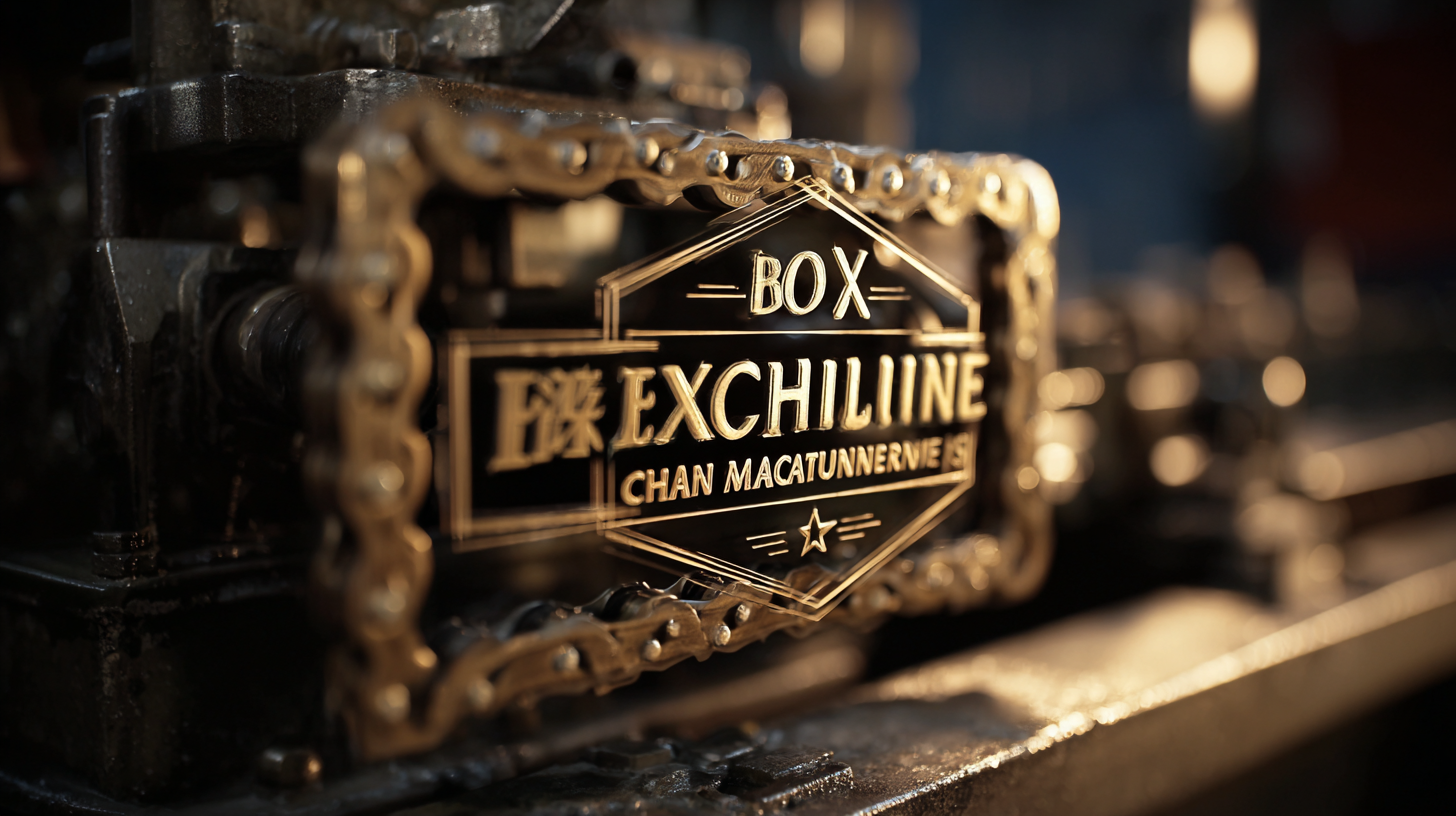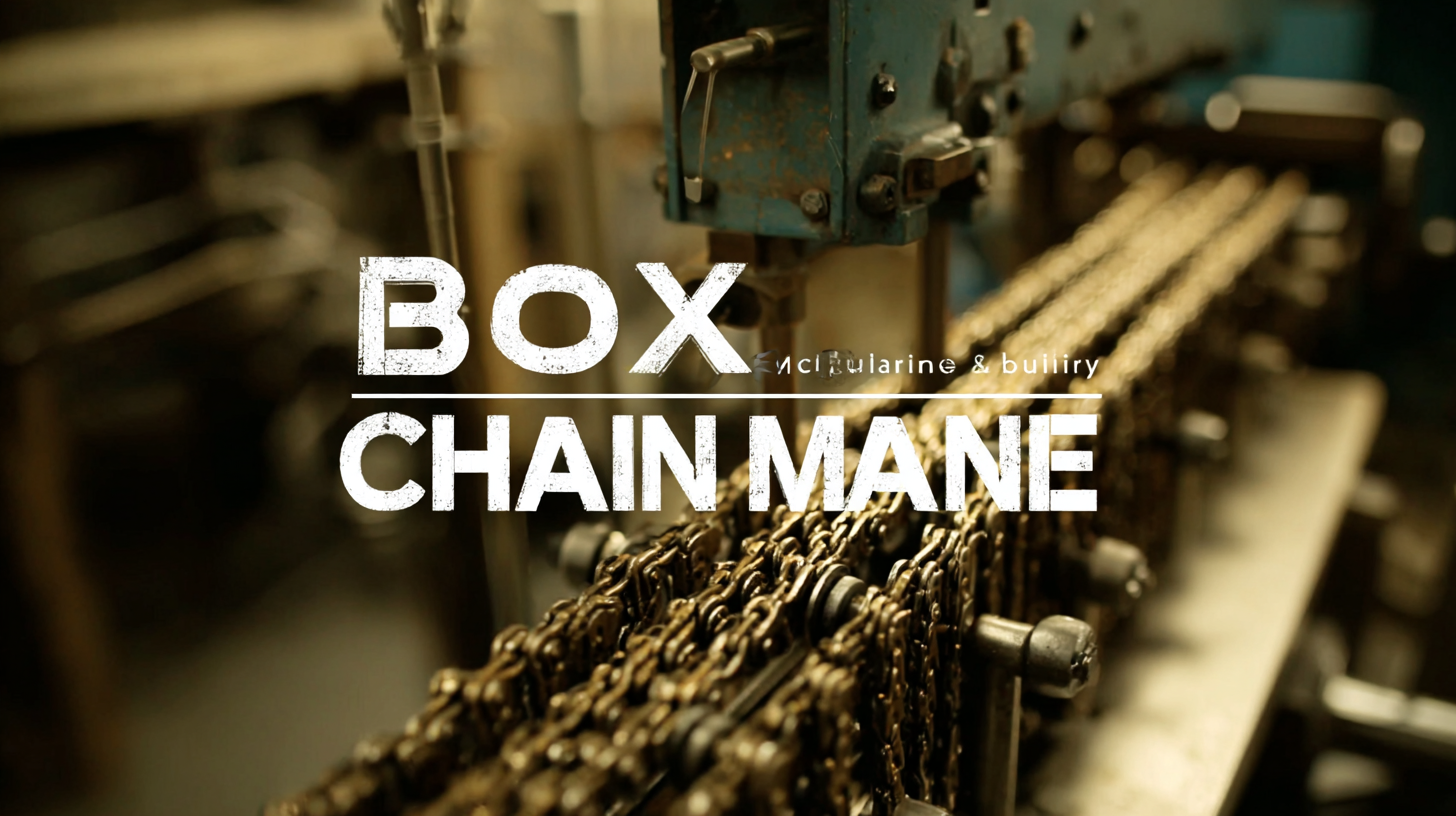In the rapidly evolving landscape of global manufacturing, the Box Chain Making Machine has emerged as a pivotal component driving efficiency and excellence in production processes. According to a recent industry report by MarketsandMarkets, the global machinery market is projected to reach $600 billion by 2025, with advanced manufacturing technologies like box chain machinery playing a crucial role in meeting the increasing demand for high-quality, durable products. As manufacturers in China adopt innovative practices and state-of-the-art machinery, they not only enhance their competitive edge but also contribute to a sustainable supply chain that benefits businesses worldwide. The efficiency of the Box Chain Making Machine allows for streamlined production, reduced waste, and improved product quality, underpinning its significance in the manufacturing sector.

The box chain machinery manufacturing sector in China has undergone a significant transformation, largely driven by innovative technologies. According to a report by MarketsandMarkets, the global market for box chain machinery is projected to reach USD 1.2 billion by 2027, growing at a CAGR of 4.6%. This growth is propelled by advancements in automation, robotics, and IoT integration, allowing manufacturers to enhance efficiency and precision in their operations.
One notable innovation is the incorporation of smart machinery, which not only optimizes the production process but also provides real-time data analytics. As per a study from McKinsey, companies that embrace Industry 4.0 technologies can increase their productivity by up to 30%. Chinese manufacturers are at the forefront of this transition, implementing AI and machine learning algorithms to reduce downtime and improve product quality in box chain production.
Furthermore, sustainable manufacturing practices are becoming increasingly important. The latest industry reports indicate that nearly 60% of manufacturers are investing in eco-friendly technologies, aiming to minimize waste and reduce energy consumption. This not only aligns with global sustainability goals but also positions Chinese manufacturers competitively in the global market, making them leaders in the manufacturing of box chain machinery.
China's box chain machinery manufacturing has established itself as a cornerstone for global markets, showcasing significant advantages that drive success. One of the key benefits is the robust supply chain infrastructure that China offers. With an extensive network of suppliers and manufacturers, companies can streamline production processes, minimizing lead times and enhancing overall efficiency. This efficiency is crucial in today's fast-paced global marketplace, where responsiveness to customer demands can dictate competitive advantage.
Moreover, China's growing innovation capabilities in advanced industries have propelled the box chain machinery sector forward. As technological advancements continue to emerge from Chinese universities and local enterprises, manufacturers can implement cutting-edge solutions that enhance product quality and performance. This transition towards embracing innovation not only serves the domestic market but also positions Chinese manufacturers favorably on the global stage, catering to the evolving needs of international clients while navigating the complexities of geopolitical dynamics. The strategic advantages of China’s manufacturing sector provide a formidable foundation for sustained success in the global market, making it a key player in the box chain machinery industry.
| Dimension | Description | Advantage |
|---|---|---|
| Cost Efficiency | Affordable manufacturing compared to other countries. | Lower production costs lead to competitive pricing. |
| Quality Standards | Strict adherence to international quality standards. | Ensures reliability and longevity of machinery. |
| Innovation | Investment in R&D for advanced machinery solutions. | Stays ahead of market trends with cutting-edge technologies. |
| Supply Chain | Robust supply chain management strategies. | Ensures timely delivery and production scalability. |
| Customization | Ability to offer tailored solutions to clients. | Meets specific needs of diverse global markets. |
In the realm of box chain machinery manufacturing, quality control standards play a pivotal role in ensuring products meet both domestic and international expectations. According to a recent industry report from the China Machinery Industry Federation, over 70% of manufacturers are turning to advanced quality management systems to enhance their production processes. This shift is crucial as the global market increasingly demands higher durability and reliability from box chain products. Factories in China are now adopting strict adherence to ISO 9001 standards, which not only streamline operations but also minimize defects, thereby boosting customer satisfaction.

Tips for manufacturers looking to enhance their quality control processes include investing in automation technology and staff training. Automation can significantly reduce human error, while well-trained employees can maintain stringent quality checks throughout the production line. Additionally, utilizing statistical process control techniques can provide real-time data on production quality, allowing for immediate corrective actions when deviations occur.
Moreover, implementing a robust supply chain management strategy is essential. Approximately 60% of production issues stem from subpar materials sourced from suppliers. Conducting thorough vendor assessments and establishing strong relationships can lead to improved material quality, which in turn elevates the overall product standards.
Sustainable practices in the production of box chain machinery are becoming increasingly vital in China's manufacturing landscape. As reported by the China Industrial Association, the implementation of eco-friendly production methods has led to a 30% reduction in waste generation over the past five years. Companies are adopting advanced technologies such as automation and machine learning to optimize resource usage, significantly lowering their carbon footprint. This shift not only benefits the environment but also enhances operational efficiency, aligning with global sustainability goals.
In addition to waste reduction, the use of renewable energy sources is gaining traction in box chain machinery production. According to a report from the Asian Development Bank, around 40% of manufacturing firms in China are now utilizing solar energy and other renewable resources in their operations. This transition has not only reduced operational costs but has also made these manufacturers more attractive to international clients prioritizing sustainable supply chains. By focusing on sustainable practices, China's box chain machinery industry is positioning itself for long-term success in the global market.
In the realm of box chain machinery manufacturing, customization is key to meeting the diverse needs of global clients. With the industry projected to grow at a CAGR of 5.2% over the next five years according to a recent report by Market Research Future, manufacturers are increasingly focusing on tailored solutions. China, being a leading hub for manufacturing, stands out with its advanced technology and agile production capabilities that allow for tailored designs. This commitment to customization not only satisfies client specifications but also enhances operational efficiency, setting a benchmark for excellence.

Tips for effective customization in box chain machinery include conducting thorough market research to understand client requirements and staying updated with technological advancements. Leveraging data analytics can help manufacturers predict trends and adapt quickly. As noted in a TechNavio report, the demand for high-quality and customized machinery is rising, making it crucial for manufacturers to invest in R&D to innovate and refine their product offerings.
Moreover, fostering collaboration with clients can lead to better customization outcomes. By engaging in open dialogues, manufacturers can gain insights into the specific needs of their clients, which can inform design adjustments and improve customer satisfaction. According to research by Deloitte, companies that prioritize customer-centric strategies are 60% more profitable compared to their competitors. Thus, focusing on client collaboration and customization not only drives business success but also cements a company's reputation in the global market.
